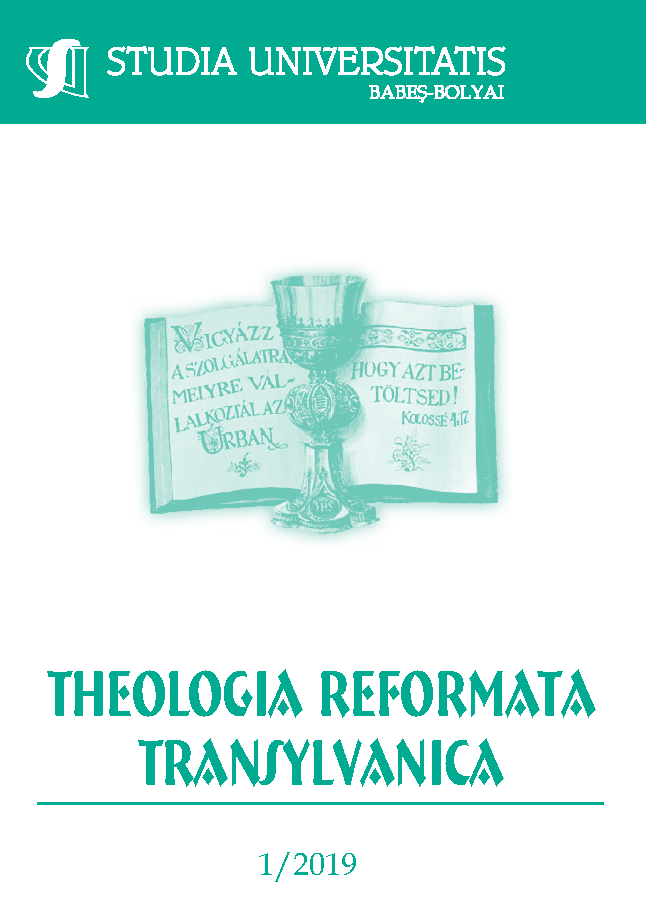Néhány lelkigondozói szempont a türelem fogalmi megközelítéséhez
DOI:
https://doi.org/10.24193/subbtref.64.1.07Keywords:
toleration, fact, psychology, transactions, relational ethicsAbstract
Some Pastoral Aspects about Approach of Toleration’s Concept.
Toleration has many concepts. One of these concepts can be one of pastoral care. Why do we need this? You find an answer in “Some pastoral aspects about approach of toleration’s concept”. In pastoral care, we have to be open for different concepts even about toleration, because there are several different life stories and cases. This essay also includes my personal view for toleration that could be used in dialogs and meetings. For being able to dedicate this personal view, I am using the four-dimensional model about relations of humankind, of people, and of concepts. This approach is a challenge and at the same time – according to my experience – it is a helpful possibility. Challenge: how to be authentic and how to use the concept of toleration authentically and recognizing its colourful and multi-directional meaning? Possibility: because it gives chances for responsible and at the same time for a free “common ground” (what can be named after Buber “the place between” people who have met). The purpose of dialog looks forward to help finding own spiritual sources. The purpose of pastoral care is to lead the seeker to his or her sources. This common ground is where the dialog and meetings can happen be-tween the helper and the helped. From this point of view, pastoral care is about being authentic with ourselves (who would live in pastoral care) with who is asking our help and of course with God. The model of contextual pastoral care has four dimensions. These dimensions are: facts, psychology, transactions, and relational ethics. The frames or aspects and of approach for toleration’s concept can be read from its four dimensions. I learned about these four dimensions in a contextual treatment studying and experiencing the challenges and the possibilities, too. In this approach the helper has to learn about facts of whom he or she is helping in or-der to know something about the concept of his or her toleration. These facts are biological and all that is related to his or her life. According to facts’ dimension, the question is what and how much help one received and gave in his relations in her or his own family. The question topic is: what does toleration mean in her or his life and how he or she deals in his or her gain – lose games? The second dimension searches the trust experiences in his or her life. This is related with the “temporary object”. Experiences of rewards, pains, disappointments in expectations of her or his life are some aspects that can help in approaching the concept of toleration with who we talk. These aspects are about the life’s experience sources. The third dimension searches for the concept of toleration in family and his or her relations of everyday life. The concept of toleration can be touched on the fields of relation of “I” and between family members and the world near him or her. Finally the fourth dimension of aspect in contextual approaching is the relational ethics. It is important to look after possibilities and after needs in the order to do in a correct way the giving and receiving. This balance of relationships is used by Böszörményi-Nagy Iván, whose name is related to contextual approach and therapy.
References
BALINT, Peter: Respecting Toleration, Oxford, 2017.
BALOYANNIS, Stavros I.: Psihologie pastorală, Iasi, 2015.
BODÓ Sára: Gyászidőben, Kálvin Kiadó, Budapest, 2013.
BÖSZÖRMÉNYI-NAGY Iván – KRASNER, Barbara R.: Kapcsolatok kiegyensúlyozásának dialógusa, Budapest, 2001.
BUBER, Martin: Én és Te, Budapest, 1991.
CARDINAL RAITZINGER, Joseph: Truth and Tolerance, San Francisco, 2004.
CARSON, D. A.: The Intolerance of Tolerance, Cambridge, 2012.
DEES, Richard H.: Trust and Toleration, London, 2014.
DUCOMMUN-NAGY, Catherine: Lojalitás erő, mely gúzsba köt vagy felszabadít, Kolozsvár, 2014.
ERLEWINE, Robert: Monotheism and Tolerance. Indiana Press University, 2012.
FLASKAY Gábor: Függőség, tárgykapcsolat, viszontáttétel, Budapest, 1994.
FORST, Rainer: Toleration in Conflict, Cambridge, 2016.
FRIEDMAN, Edwin H.: Nemzedékről nemzedékre, Kolozsvár, 2008.
GALEOTTI, Anna Elisabetta: Toleration as Recogniton, Cambridge, 2002.
HALLESBY, Ole: Személyiségtípusok, Harmat, Budapest, 2002.
HAMILTON, Gregory N.: Tárgykapcsolat-elmélet a gyakorlatban, Budapest, 1996.
HORVÁTH György: A tartalmas gondolkodás, Budapest, 1984.
HURTON, Jhon – MENDUS, Susan: Aspects of Toleration, New York, 1985.
KAMEN, Henry: The Rise of Toleration, World University Library, 1967.
KING, Preston: Toleration, London, 1998.
KISS Gábor: A felelősség motivációja, in: http://reformatus.hu/mutat/a-felelosseg-motivacioja/ (utolsó megtekintés dátuma: 2018. 03. 14.)
KISS Jenő – MEULINK-KORF, Hanneke – MELZER, Annete: Megmásíthatlan jogigény. Betekintés a kontextuális lelkigondozásba és segítésbe, Kolozsvár, 2013.
MENDUS, Susan – EDWARDS, David: On Toleration, Oxford, 1987.
MEULINK-KORF, Hanneke – VAN RHIJN, Aat: A harmadik – akivel nem számoltak, Kolozsvár, 2009.
MICHIELSEN, May – Wim VAN MULLINGEN: Összetartozásban a kontextuális segítségről, Kolozsvár, 2010.
MORENO-RIANO, Cerson: Tolerance in the Twenty-First Century, Lexington Books, 2006.
NÉMETH Dávid: Isten munkája és az ember lehetőségei a lelkigondozásban, Budapest, 1993.
NICOLESCU, Costin (pref.): Zeul toleranței și descreștinarea creștinismului, București, 2009.
PETHŐ Bertalan: Pszichiátria és emberkép, Budapest, 1986.
SÁNDOR Szilárd: Normatív és etikai szemléletek (A szentség szabadsága, avagy a szabadság szentsége), in: Studia Universitatis Babeș-Bolyai, Theologia Reformata Transylvanica, 59/1–2, 2014. 99–118.
STANTON, Graham N. – STROUSMA, Guy G.: Tolerance and Intolerance in Early Judaism and Christianity, Cambridge, 1998.
SZÉKELY Ilona: Tárgykapcsolat-elmélet a családterápiában, Budapest, 2003.
VAN HEUSEN, Amy – VAN DEN EERENBEEMT, Else-Marie: A változó egyensúly. Böszörményi-Nagy Iván egyéni és családterépiás elmélete és módszere, Budapest, 2001.
VERGOTE, Antonie: Valláslélektan, Budapest, 2001.
VOIGHT Vilmos: A vallási élmény története, Budapest, 2004.
VON THUN, Friendmann Schulz: A kommunikáció zavarai és feloldásuk. Általános kommunikációs pszichológia, Budapest, 2012.
WALTZER, Michael: On Toleration, London, 1997.
WARTOFSKY, Marx W.: A tudományos gondolkodás fogalmi alapjai. Bevezetés a tudományfilozófiába, Budapest, 1977.
Downloads
Published
How to Cite
Issue
Section
License
Copyright (c) 2019 Studia Universitatis Babeș-Bolyai Theologia Reformata Transylvanica

This work is licensed under a Creative Commons Attribution-NonCommercial-NoDerivatives 4.0 International License.






